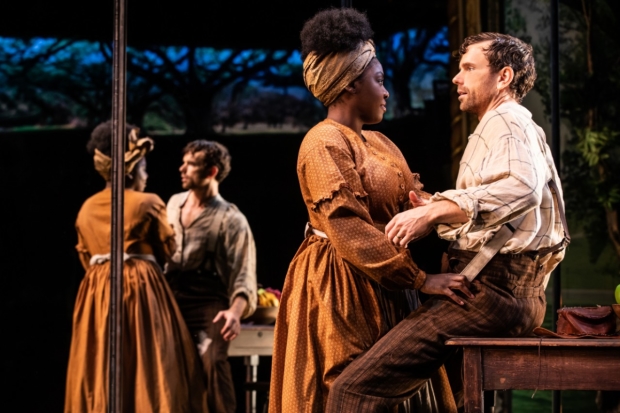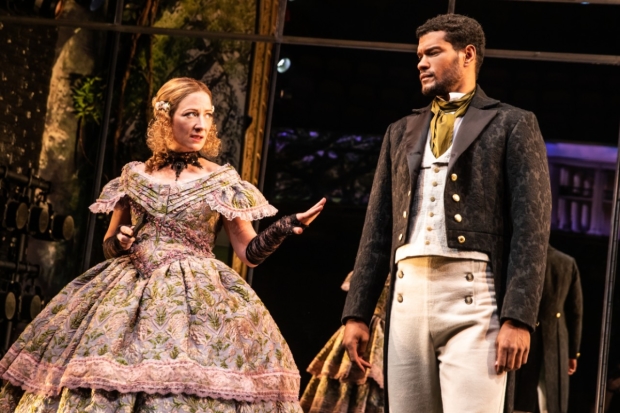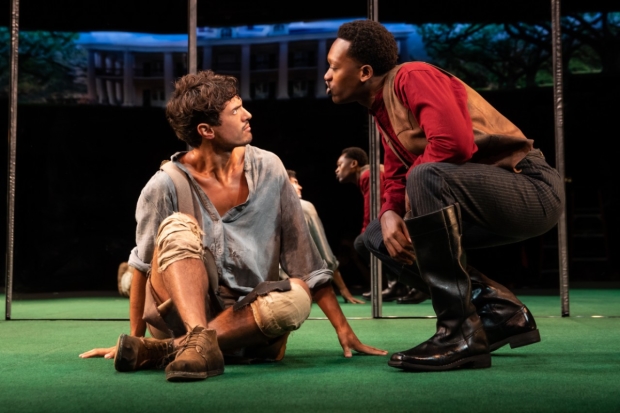Seeing the Oppressor in Your White Lover's Eyes in Slave Play
Jeremy O. Harris’s explosive downtown hit comes to Broadway.

(© Matthew Murphy)
For the past few months, I have been anticipating the run of Jeremy O. Harris's Slave Play on Broadway with a mixture of excitement and dread. It's a strange way to feel about a work that I've come to consider a masterpiece of modern theater. The play made its world premiere downtown last November at New York Theatre Workshop, and tickets were harder to come by than an L train after midnight.
My review of that production was one of the most difficult I'd written. The play contains startling depictions of rape. It explores the fetishizing of domination and submission along racial lines. It disturbs our sense of propriety by making the horrific comical. But I had the toughest time articulating what was happening to the black characters in this play. I felt inadequate to the task of writing about it, but I was sure it was a significant piece of writing worth struggling with. Harris gives us a lot to process, and processing this play is work.
Processing. Work. Those two words loom large in this disorienting, dauntless, and daring play about the legacy of American slavery and how it is interwoven into our national and even our psycho-sexual DNA. Off-Broadway audiences greeted it with rousing applause and howls of execration. Walkouts were not uncommon. And many on social media decried the play — and Harris — without ever having seen the show. Whatever the reaction, no one who knew anything about it seemed to be indifferent to it.
After seeing Slave Play a second time — you should see it at least twice — I am now processing it anew, and whenever I can, I do so with others from different backgrounds who have also seen it — because Slave Play provokes conversations about racial topics that Americans are often too afraid to have without the kind of shared experience that this play provides.

(© Matthew Murphy)
It's tempting to give a full summary of the plot, but that would reveal a twist that occurs after the first act. And since the play will still be new to many who see it on Broadway at the Golden Theatre, you'll find no spoilers here. The following will give you an idea of what to expect.
The scene is the MacGregor plantation somewhere in Virginia. Clint Ramos's memorable set comprises rows of full-length mirrors that stand at the back of the stage reflecting a picture of the plantation's big house and the faces of the audience members looking like rows of cotton (there can be no mistaking the intention of director Robert O'Hara here). The image puts us onstage and makes us residents of the MacGregor plantation, and Jiyoun Chang's lighting, slyly rising on the audience from time to time, reminds us where the "demons" are.
On the plantation, we meet three interracial couples in separate scenes. Kaneisha (Joaquina Kalukango), a slave, enters and begins sweeping. Suddenly, we hear Rihanna's song "Work" waft down from who knows where. Kaneisha starts twerking to the music as overseer Jim (Paul Alexander Nolan) comes in and remarks that her dancing is turning him on. At first trembling with fear, Kaneisha soon yields willingly to Jim's order to eat a cantaloupe off the floor and submit to his sexual advances while she, perplexingly, seems to take charge of the situation.
Next, we see Mistress Alana (Annie McNamara) dressed like a Southern belle (ironic costume design by Dede Ayite) in a state of high sexual arousal as she calls upon her black servant Phillip (Sullivan Jones) and asks him to play a "Negro spiritual" on his violin. As the music gets her more worked up, she produces a large dildo. What she does with that will also remain unspoiled here.

(© Matthew Murphy)
Last, we meet black overseer Gary (Ato Blankson-Wood) — who uses the N-word as his honorific — and watch as he forces his white (or rather, off-white) underling, Dustin (James Cusati-Moyer), to grovel at his feet and lick his boots. All three couples then appear onstage in a wild chaos of action that continues till Jim inexplicably shouts the word "Starbucks." Two women (Chalia La Tour and Irene Sofia Lucio) enter, and suddenly "slave play" takes on a whole different meaning. What follows is a mind-boggling series of revelations from eight characters as they process their feelings for each other and uncover buried secrets about themselves.
O'Hara, known for his own intrepid plays such as Bootycandy and Barbecue, is a stellar match for Harris's script. He puts us in a fast car without seatbelts and floors it for two hours and 15 minutes (no pit stop). His brilliant cast — all but Kalukango (who gives an especially award-worthy turn as Kaneisha) were in the off-Broadway production — delivers ferocious, well-honed performances, and lets the laughs come fast and furious until the final scenes when Kaneisha tells her white lover about the demons that haunt her, the ancestors who watch her, and the slave master she feels lying beside her in bed.
Audience members from diverse racial backgrounds will have different experiences at Slave Play, as I learned firsthand while discussing it with a black friend on our walk from the theater. Seeing it a second time has strengthened my opinion that Slave Play bears the marks of genius, and by "genius" I mean that rare gift of fresh insight that allows others to see the world in a new way. Such works are often derided until they have been around awhile and processed. I'm still processing — and listening.








